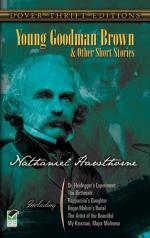|
This section contains 1,214 words (approx. 5 pages at 300 words per page) |

|
SOURCE: "'Young Goodman Brown and Puritan Justification," in Studies in Short Fiction, Vol. XI, No. 2, Spring, 1974, pp. 200-03.
In this essay, Johnson examines "Young Goodman Brown" in terms of the Puritan doctrine of justification, in which "God might open the hearts of certain men, allowing them to descend within in order to know themselves."
Criticism of "Young Goodman Brown" has traditionally been divided into speculations about the nature of the hero's journey. Was it a dream? Or was it reality? Newton Arvin is usually cited as representative of the view that Goodman Brown received a true vision of human depravity in the woods, and F. O. Matthiessen is representative of the view that the sins witnessed by young Goodman Brown were creatures of his own making [Newton Arvin, Hawthorne, 1929; F. O. Matthiessen, American Renaissance, 1941]. Almost no modern critic supports Arvin's view, however, so the old argument rarely arises...
|
This section contains 1,214 words (approx. 5 pages at 300 words per page) |

|


